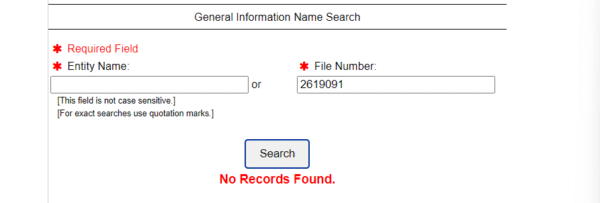The U.S. state government of Delaware has finally eliminated the simulated BlackRock iShares XRP Trust previously spotted on its corporation portal.
The Crypto Basic can confirm that the file number initially assigned to the now-deleted XRP ETF returns a “No Records Found” prompt when searched on the Delaware ICIS website.

While visible on Delaware’s site, the counterfeit XRP ETF filing generated considerable buzz in the crypto community. Many individuals argued its genuineness amid its appearance on an official state government outlet.
However, deleting the iShares XRP Trust from Delaware’s ICIS website confirms the fraudulent nature of the filing. It has also dispelled speculations from community members who considered its presence a potential indicator of authenticity.
– Advertisement –
Notably, this removal comes at least 24 hours late, with no direct commentary from BlackRock regarding the XRP ETF fling. Meanwhile, a BlackRock-affiliated news channel noted that the iShares XRP Trust was a sham.
Furthermore, the BlackRock affiliate mentioned the issue was escalated to the state government. In particular, Delaware authorities contacted the state’s Department of Justice on the appearance of the fraudulent submission.
While specific details surrounding the submission, such as the culprits involved, are yet to be publicized, it is believed that the removal of the simulated filing is in line with the ongoing investigations on the matter.
Potential Criminal Charges
It is worth mentioning that filing a fake exchange-traded fund in the United States could lead to various criminal charges. Some potential criminal charges include Wire Fraud, which involves submitting false information electronically.
Also, the culprits risk Securities Fraud charges for knowingly providing false information related to securities, like an ETF. Emphatically, making false statements to government agencies is itself a punishable offense.
In particular, a defendant convicted of violating the False Statements code could face a maximum sentence of five years or a $10,000 fine. The securities fraud offense has a similar prison sentence with a $250,000 fine.
Has this Happened Before?
Notably, submitting fraudulent crypto ETFs is not novel in the crypto sphere. In 2021, individuals posing as Grayscale attempted to submit a fraudulent ETF through the Delaware Corporation website. Nevertheless, the ruse was promptly exposed and discredited.
However, representatives from the Delaware Division of Corporations failed to disclose any identifying information regarding the entities behind the filing, as the documents lacked personal information.
Follow Us on Twitter and Facebook.
Disclaimer: This content is informational and should not be considered financial advice. The views expressed in this article may include the author’s personal opinions and do not reflect The Crypto Basic’s opinion. Readers are encouraged to do thorough research before making any investment decisions. The Crypto Basic is not responsible for any financial losses.
-Advertisement-
Source: https://thecryptobasic.com/2023/11/16/delaware-finally-takes-down-fake-xrp-etf-filing-culprit-risks-fine-and-imprisonment/?utm_source=rss&utm_medium=rss&utm_campaign=delaware-finally-takes-down-fake-xrp-etf-filing-culprit-risks-fine-and-imprisonment